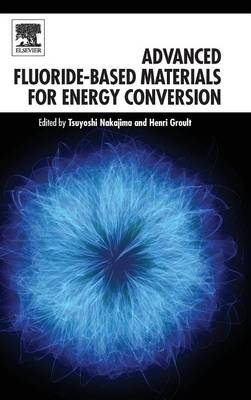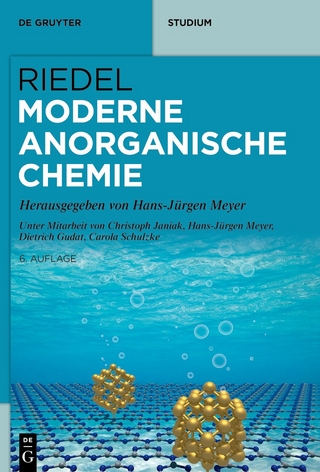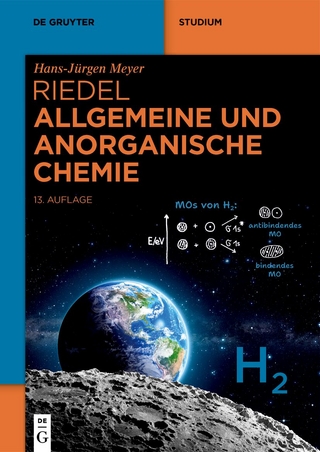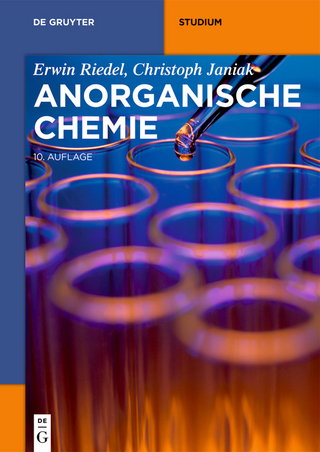
Advanced Fluoride-Based Materials for Energy Conversion
Elsevier Science Publishing Co Inc (Verlag)
978-0-12-800679-5 (ISBN)
As electronic devices, from cell phones to hybrid and electric vehicles, are increasingly common and prevalent in modern lives and require dependable, stable chemical energy devices with high-level functions are becoming increasingly important. As research and development in this area progresses rapidly, fluorine compounds play a critical role in this rapid progression. Fluorine, with its small size and the highest electronegativity, yields stable compounds under various conditions for utilization as electrodes, electrolytes, and membranes in energy devices.
The book is an ideal reference for the chemist, researcher, technician, or academic, presenting valuable, current insights into the synthesis of fluorine compounds and fluorination reactions using fluorinating agents.
Tsuyoshi Nakajima is Professor in the Department of Applied Chemistry, Aichi Institute of Technology in Japan. He has worked on fluorine chemistry and electrochemistry (that is, fluorinated materials) for primary and rechargeable lithium batteries, and fluorine-, fluoride-, or oxyfluoride-graphite intercalation compounds. Li/(CF)n battery is the first primary lithium battery commercialized on the basis of the research on graphite fluoride which was performed in his laboratory at Kyoto University. His research was on the discharge mechanism of Li/(CF)n battery and synthesis of graphite fluoride, (CF)n with excellent discharge performance. The importance of carbon-fluorine compounds as battery materials was first recognized by graphite fluoride cathode of Li/(CF)n battery. Furthermore, new graphite anode for electrolytic production of fluorine gas was developed on the basis of his work on fluorine-graphite intercalation compound with high electrical conductivity. Recently. his research interest is on the application of fluorine chemistry to rechargeable lithium batteries. Fluorination techniques were applied to surface modification of graphite anode which increases the capacities of graphite anode and enables the low temperature operation of lithium ion battery. For the application of lithium ion battery using flammable organic solvents to electric sources of hybrid and electric vehicles, high safety is the most important issue. He has found that organo-fluorine compounds are excellent new solvents with high oxidation stability (that is, high safety for rechargeable lithium batteries). He published about 230 papers and 24 books. In academic societies, he served as chairman of JSPS 155th Committee on Fluorine Chemistry; The Society of Fluorine Chemistry, Japan; Executive Committee of Carbon Society of Japan; and Regional Editor and Editorial Board of J. Fluorine Chemistry. Henri Groult is Director of Research of CNRS-UPMC-ESPCI UMR 7612, University of Pierre and Marie Curie (Paris 6) in France. He has devoted his research life to fluorine chemistry, electrochemistry, and molten salt chemistry. His main research subjects are electrolytic production of fluorine gas, fluorine compounds for primary and secondary lithium batteries, and electrochemical properties of molten fluorides and chlorides. He has obtained interesting results on fluorine evolution reaction on carbon electrodes, discharge behavior of carbon-fluorine compounds, charge/discharge characteristics of metal fluorides, and electrochemical properties of molten salts. On these subjects, he published more than 100 papers and 7 books. His activity has played an important role in fluorine chemistry in France. He has served as Director of the French Network of Fluorine, Chairman of the 17th European Symposium on Fluorine Chemistry (Paris, July 2013), and Editorial board of J. Fluorine Chemistry.
Chapter 1 High performance of lithium ion batteries using fluorine compounds Chapter 2 Electrochemical behavior of surface-fluorinated cathode materials for lithium ion battery Chapter 3 Fluoride cathodes for lithium ion battery Chapter 4 Fluoro-sulfates and -phosphates as new cathode materials for lithium ion battery Chapter 5 Ionic liquids, ionic crystals, and plastic crystals of fluorohydrogenates Chapter 6 Syntheses of new components for lithium battery electyrolytes: solvents, conductive salts, and additives Chapter 7 Safety improvement of lithium ion battery by organo-fluorine compounds Chapter 8 Artificial SEI for anode materials: fluorinated and non-fluorinated additives Chapter 9 Surface modification of carbon anodes for lithium ion batteries by fluorine and chlorine Chapter 10 New PVDF binders for lithium ion battery Chapter 11 Enhancement of the electrochemical performances of graphite fluorides by electro-polymerization Chapter 12 New nano-C-F compounds for non-rechargeable lithium battery Chapter 13 Fluoro-polymers for fuel cell applications Chapter 14 Fluoro-polymers for electrochemical applications Chapter 15 Surface-fluorinated carbon materials for super-capacitors Chapter 16 Fluorine compounds for Na batteries Chapter 17 Application of carbon materials derived from fluorocarbons to electrochemical capacitor
| Erscheint lt. Verlag | 11.5.2015 |
|---|---|
| Sprache | englisch |
| Maße | 152 x 229 mm |
| Gewicht | 790 g |
| Themenwelt | Naturwissenschaften ► Chemie ► Anorganische Chemie |
| ISBN-10 | 0-12-800679-X / 012800679X |
| ISBN-13 | 978-0-12-800679-5 / 9780128006795 |
| Zustand | Neuware |
| Informationen gemäß Produktsicherheitsverordnung (GPSR) | |
| Haben Sie eine Frage zum Produkt? |
aus dem Bereich


